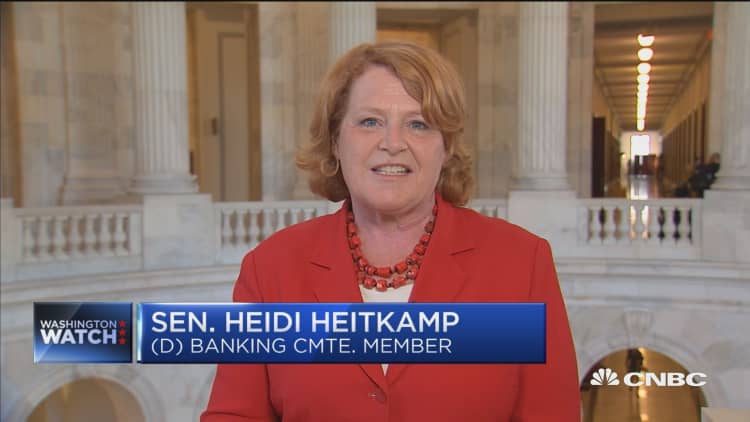Primaries in five states Tuesday led to the downfall of a Republican critic of President Donald Trump and locked in the field for two of the Senate's critical November battlegrounds.
Rep. Mark Sanford's loss in the GOP primary for South Carolina's 1st District shows the president's enormous sway over his party. Trump endorsed election winner Katie Arrington on Tuesday afternoon, contending Sanford "has been very unhelpful." The president then cheered Arrington's win Wednesday morning, saying he defied his advisors to back her.
Elsewhere, Democratic Sen. Heidi Heitkamp and Republican Rep. Kevin Cramer will face off in North Dakota's pivotal Senate election, as expected. In another swing Senate race, Republican Sen. Dean Heller will take on Democratic Rep. Jacky Rosen in Nevada.
Here are some of Tuesday's notable results:
Sanford is second GOP incumbent to fall in 2018
In losing to Arrington, Sanford became the second incumbent Republican House member to lose a primary this year. Rep. Robert Pittenger of North Carolina fell to former pastor Mark Harris last month.
Allegiance to Trump has played a prominent role in Republican House and Senate primaries across the country. Still, the president took a rare step Tuesday in publicly opposing a GOP incumbent from his own party.
While the effect of Trump's last-minute endorsement is unclear, Arrington's winning campaign strategy showed the president's firm grip on his party's direction. Arrington, who is favored to win the general election in the red district, made supporting Trump a centerpiece of her primary run. In her victory speech, she declared "we are the party of Donald J. Trump."
In conceding the race, Sanford defended his disagreements with Trump.
"It may have cost me an election, but I stand by every one of those decisions to disagree with the president, because I didn't think they would be concurrent with the promises I made when I first ran for office and for the very voices of the people of the 1st District that I represent," he said Tuesday night, according to the Charleston-based Post and Courier newspaper.
Sanford largely voted with Trump in Congress. But he broke with the president by opposing the $1.3 trillion spending bill passed earlier this year and the GOP-written farm bill that fell in the House.
The congressman has also criticized Trump's effect on political discourse. Following the shooting of House Majority Whip Steve Scalise last year, Sanford said Trump is "partially to blame for demons that have been unleashed."
Just last week, a different Trump critic struggled in a red-state primary election. GOP Rep. Martha Roby, running in Alabama's 2nd District primary, failed to garner 50 percent of the vote and was forced into a runoff with ex-congressman Bobby Bright.
In 2016, she pulled her endorsement from Trump after the revelation of the "Access Hollywood" tape in which the president bragged about touching women without their consent.
Senate contenders breeze to general election
Both Heller and Rosen easily won their Senate primaries in Nevada. Heller is considered perhaps the most vulnerable Senate Republican facing re-election this year. Democrat Hillary Clinton won his state by about 2 percentage points in 2016.
Senate Democrats' campaign arm has attacked the Republican for his stance on health care. Last year, he pledged not to vote to repeal the Affordable Care Act if it hurt the Nevadans covered by the state's Medicaid expansion. He then voted for a bill to partly repeal the health-care law.
Senate Republicans' campaign arm, meanwhile, is trying to tie Rosen to billionaire donor Tom Steyer, who has spent millions calling from Trump's impeachment. The congresswoman has not said yet whether she supports the impeachment effort. Democratic leaders have largely avoided talk of impeachment, fearing it could hurt candidates in swing areas.
In North Dakota, Heitkamp will try to hold off Cramer in a state Trump won by more than 30 points in 2016. The general election rhetoric there has also focused on whether Heitkamp has done enough to support Trump's agenda.
The National Republican Senatorial Committee has repeatedly argued the senator has too often aligned with national Democrats. Heitkamp, for her part, has highlighted her votes for many Trump nominees and certain policies backed by the president.

She championed legislation to reduce regulations on all but the largest U.S. banks, saying it would help community lenders in North Dakota. Heitkamp also stood near Trump at an event where he signed the legislation, reportedly drawing Cramer's ire.
Both races will play a major role in determining whether Republicans can keep or expand their 51 seat to 49 seat majority in the Senate. The party breakdown has implications for whether Trump's chosen political and judicial nominees can get confirmed, as well as the policies the chamber pursues.
In Virginia, incumbent Democratic Sen. Tim Kaine ran uncontested in the primary. Trump-backed Republican Corey Stewart prevailed on the Republican side. He campaigned in part on saving Confederate monuments.
Women have a big night in Virginia
Democratic voters picked women nominees in all four of the GOP-held Virginia House districts considered competitive in November. One woman currently serves in the state's congressional delegation: Republican Rep. Barbara Comstock, one of the most vulnerable members of Congress.
State Sen. Jennifer Wexton easily won the Democratic primary for Comstock's increasingly blue 10th District. The congresswoman won her GOP primary with about 61 percent of the vote, an outcome considered weak for an incumbent who has held the seat since 2015.
Navy veteran Elaine Luria won the 2nd District Democratic primary and will take on Republican Rep. Scott Taylor. Journalist Leslie Cockburn will run against former Air Force intelligence officer Denver Riggleman in Virginia's 5th District. The seat was vacated by retiring GOP Rep. Thomas Garrett.

In Virginia's 7th District, former CIA operative Abigail Spanberger will face Republican Rep. Dave Brat.
More women are running for Congress this year than ever. The record for women House primary winners could also be broken later this year.
In another competitive House District, Nevada's 3rd, Democratic philanthropist Susie Lee is set to take on Danny Tarkanian. Tarkanian, the son of famed University of Nevada, Las Vegas basketball coach Jerry Tarkanian, narrowly lost the election for the seat to Rosen in 2016.


